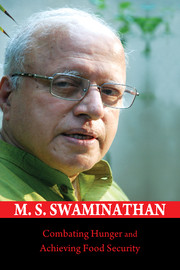Book contents
- Frontmatter
- Contents
- Foreword
- Preface
- Acknowledgements
- Abbreviations
- 1 Genesis and Growth of the Yield Revolution in Wheat
- 2 Our Agricultural Heritage
- 3 Shaping Our Agricultural Destiny
- 4 Thrust on Farm Revival
- 5 Nutri-farm Movement
- 6 Nutrition-sensitive Agriculture
- 7 Food Losses and Food Waste
- 8 Rice in Zero Hunger Challenge
- 9 Monsoon Management
- 10 Importance of Ecological Conservation
- 11 Caring for Ecology and Heritage
- 12 Conserving Biodiversity
- 13 Overcoming Hidden Hunger through Aquaculture
- 14 Biofuels – The Way to Go
- 15 Food Security
- 16 Vigilance for Sustainable Food Security
- 17 Food Security and Social Protection
- 18 Food Security and its Role
- 19 Sustaining the Livestock Revolution
- 20 Challenges in the Year of Science
- 21 Agriculture and Humanism
- 22 Fostering the Science of Science Communication
- 23 Olympic Move for Saving Children
- 24 Youth: The Agents of Change
- 25 Role of Women in Agricultural Production
- 26 Know-how to Do-how
- 27 From Bengal Famine to Right to Food
- 28 Financial Institutions and Fighting Food Inflation
- 29 Public Good Research in Agriculture
- 30 The Future of Indian Agriculture
- Bibliography
3 - Shaping Our Agricultural Destiny
Published online by Cambridge University Press: 18 December 2015
- Frontmatter
- Contents
- Foreword
- Preface
- Acknowledgements
- Abbreviations
- 1 Genesis and Growth of the Yield Revolution in Wheat
- 2 Our Agricultural Heritage
- 3 Shaping Our Agricultural Destiny
- 4 Thrust on Farm Revival
- 5 Nutri-farm Movement
- 6 Nutrition-sensitive Agriculture
- 7 Food Losses and Food Waste
- 8 Rice in Zero Hunger Challenge
- 9 Monsoon Management
- 10 Importance of Ecological Conservation
- 11 Caring for Ecology and Heritage
- 12 Conserving Biodiversity
- 13 Overcoming Hidden Hunger through Aquaculture
- 14 Biofuels – The Way to Go
- 15 Food Security
- 16 Vigilance for Sustainable Food Security
- 17 Food Security and Social Protection
- 18 Food Security and its Role
- 19 Sustaining the Livestock Revolution
- 20 Challenges in the Year of Science
- 21 Agriculture and Humanism
- 22 Fostering the Science of Science Communication
- 23 Olympic Move for Saving Children
- 24 Youth: The Agents of Change
- 25 Role of Women in Agricultural Production
- 26 Know-how to Do-how
- 27 From Bengal Famine to Right to Food
- 28 Financial Institutions and Fighting Food Inflation
- 29 Public Good Research in Agriculture
- 30 The Future of Indian Agriculture
- Bibliography
Summary
where hunger rules, peace cannot prevail. Now that decisive steps to combat hunger have been taken in the form of the National Food Security Act, we should try to maximize the benefits of our major blessings. India's greatest blessings are its adherence to a democratic system of governance, an independent judiciary, which treats all citizens alike, a free and fearless media, and an autonomous Election Commission, which inspires both political and public confidence. Let us hope that we will soon have an independent and effective Lokpal (Ombudsman), which will pave the way to a corruption-free India, which is a prerequisite for a hunger-free India.
The other major paradigm shift observed in recent years is the substitution of political patronage with legal rights. Thus, during the last few years, the Government of India had enacted legislation designed to confer entitlements to information, education and work (Mahatma Gandhi National Rural Employment Guarantee Act). In addition, tribal families and other forest-dwellers have been conferred the Right to Land. The brightest jewel in the crown of Indian democracy is the conferment of the Right to Food through the National Food Security Act, through which India has taken the essential steps necessary to convert Mahatma Gandhi's dream of a hunger-free India into reality.
It is important to realize the significance of the National Food Security Act in the light of the conditions, which prevailed in the country during the first 20 years after Independence in 1947. During the 1960s, India was the largest recipient of concessional food aid, mainly under the PL480 programme of United States. In fact, during 1966, over 10 million tonnes of wheat were imported. Currently, India is due to commit over 60 million tonnes of homegrown wheat, rice and nutri-millets to fulfill the legal entitlements incorporated in the Food Security Act. Synergy between technology and public policy supported by farmers’ enthusiasm has led to this proud moment.
The need for such a frontal attack on hunger is clear from the malnutrition figures published by national and international agencies including the International Food Policy Research Institute (IFPRI), with particular reference to children, women and adolescent girls. A recent report of the Working Group on Nutrition for the Twelfth Five Year Plan (2012–17) mentions that ‘maternal and child under-nutrition levels remain persistently and unacceptably high’.
- Type
- Chapter
- Information
- Combating Hunger and Achieving Food Security , pp. 15 - 20Publisher: Cambridge University PressPrint publication year: 2016



